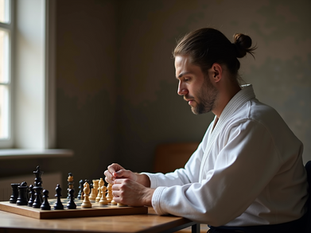
The Power of Planning in Brazilian Jiu-Jitsu: Taking Control from the Start
In Brazilian Jiu-Jitsu (BJJ), every match begins in a neutral position—a moment of calm before the storm of techniques, strategies, and movements that follow. In these crucial opening moments, both you and your opponent have countless opportunities to set the tone and direction of the match. While some athletes excel at reacting to their opponent’s moves, there’s a distinct advantage in taking a proactive approach, particularly in matches with shorter time limits. The key to gaining the upper hand from the start is to have a plan.
The Importance of a Game Plan
Approaching a match without a plan is like setting off on a journey without a map. You might eventually reach your destination, but you’re more likely to encounter unnecessary obstacles and detours along the way. By contrast, starting with a plan gives you a clear sense of direction. It allows you to dictate the pace and flow of the match, putting you in the driver’s seat from the very beginning.

When you have a plan, you approach your opponent with intent and purpose. You know what you want to achieve, whether it’s securing a specific grip, initiating a takedown, or moving into a particular guard position. This not only sets you up for success but also forces your opponent to react to your movements, giving you a psychological and tactical edge.
Mapping Out Your Strategy
Before you even make contact with your opponent, take a moment to map out your plan. Consider the following elements:
Your Strengths: What are your go-to techniques? Are you more comfortable playing from the top or bottom? Do you have a particular guard or passing style that you excel at? Tailor your plan to emphasize your strengths.
Your Opponent’s Weaknesses: If you have any information about your opponent’s style or tendencies, use it to your advantage. Do they struggle with certain positions? Are they more likely to play defensively? Incorporate this into your strategy.
The Match Context: In shorter matches, time is of the essence. You don’t have the luxury of waiting for your opponent to make the first move. A proactive approach is often more effective in these situations, allowing you to score early and maintain control.
Your Initial Moves: Decide on your first move or sequence of moves before you engage. Whether it’s a specific takedown, a guard pull, or a grip-fighting strategy, having a predetermined plan gives you immediate direction.
Proactive vs. Reactive
While reacting to your opponent’s moves can be effective, it’s generally more advantageous to be the one dictating the action. When you’re proactive, you set the pace, and your opponent is forced to play catch-up. This is especially important when you’re facing an opponent of equal size and skill level. By taking the initiative, you gain the upper hand and put your opponent on the defensive.
Of course, no plan is foolproof. BJJ is a dynamic sport, and you’ll need to be able to adapt and improvise in response to your opponent’s reactions. However, having a plan doesn’t mean being rigid—it means having a roadmap that guides your actions while allowing for flexibility when needed.
The Psychological Edge
Starting with a plan doesn’t just give you a tactical advantage; it also provides a psychological one. When you approach your opponent with confidence and a clear sense of purpose, it can be intimidating. They’ll sense that you’re in control, which can lead to hesitation and mistakes on their part. In contrast, if you’re simply reacting to their moves, you’re ceding control and allowing them to dictate the pace of the match.
In Brazilian Jiu-Jitsu, control is everything. By starting each match with a plan, you put yourself in the best possible position to take control from the outset. While you’ll still need to be able to adapt and improvise as the match unfolds, having a plan gives you a clear direction and forces your opponent to react to you rather than the other way around.
At Ocean Jiu-Jitsu, we emphasize the importance of strategy and planning in every match. Whether you’re a beginner or an advanced practitioner, learning to approach each match with a plan will help you gain the upper hand and achieve your goals on the mats. Remember, it’s better to be proactive and in control than to be reactive and at the mercy of your opponent’s moves. Start with a plan, stay flexible, and take charge from the very beginning.





